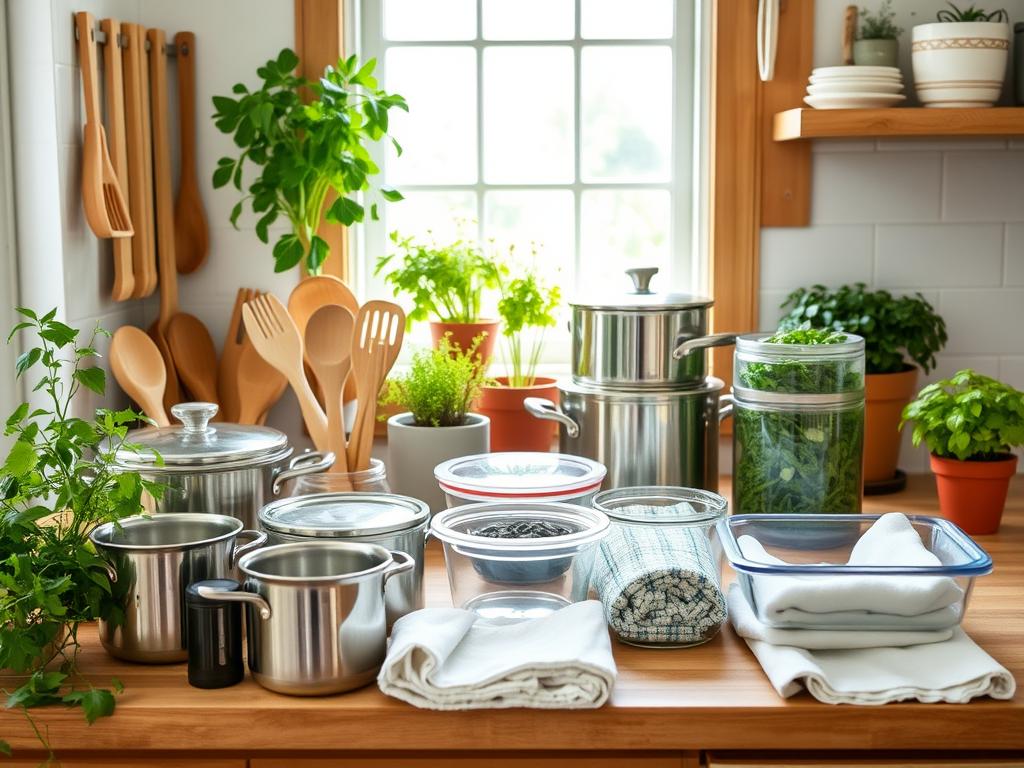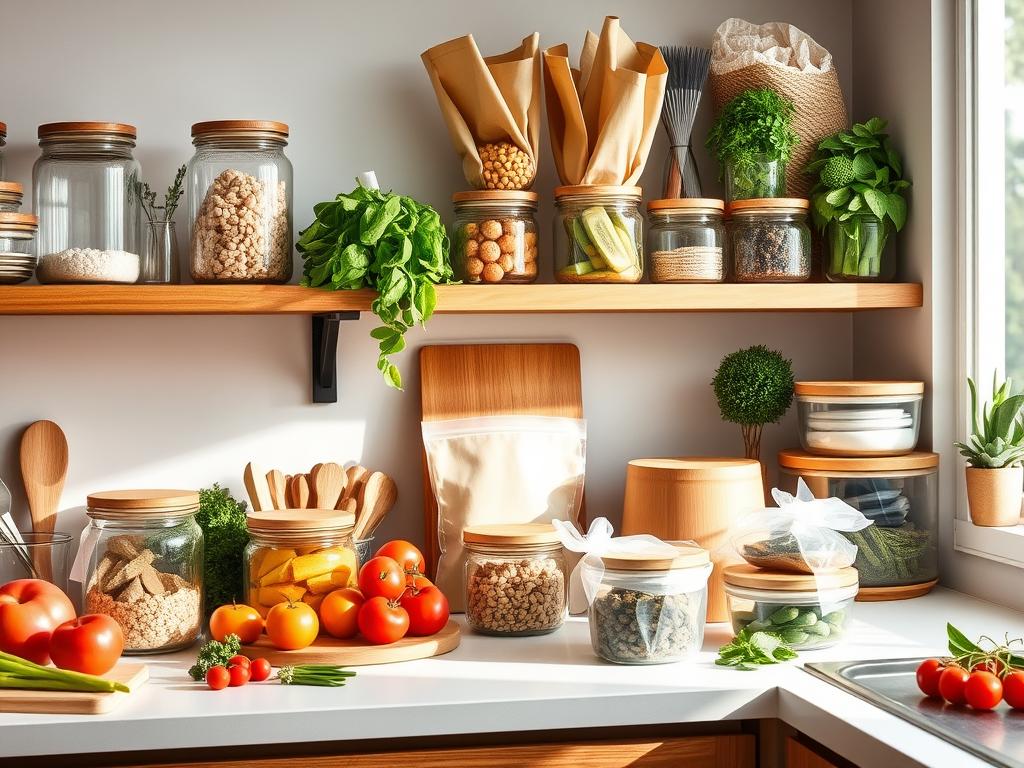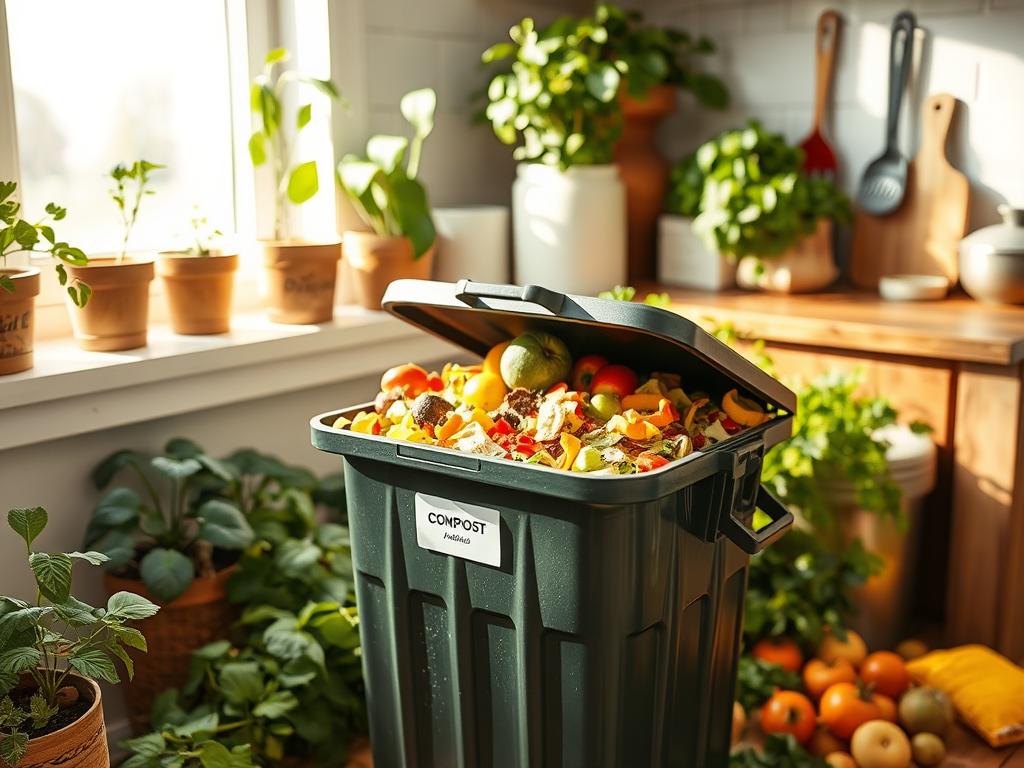Every time I step into my kitchen, the aroma of fresh herbs and the sound of sizzling pans remind me of the magic that unfolds in this sacred space. It’s not just about cooking; it’s about nurturing my family, creating memories, and making choices that can ripple out into the world. In today’s fast-paced life, it’s easy to overlook the impact our daily habits have on the environment.
However, by embracing eco-friendly kitchen tips, we can transform our kitchens into sustainable havens. With just a few thoughtful changes, we can contribute to a healthier planet while also cultivating a greener lifestyle. The following suggestions will explore how you can create a sustainable kitchen, significantly reduce your carbon footprint, and even lead to healthier eating habits.
Key Takeaways
- Opt for durable and reusable kitchenware, like stainless steel, to minimize waste.
- Embrace meal planning to cut down on food waste and enhance your cooking experience.
- Switch to sustainable wraps, such as beeswax, for preserving food without plastics.
- Support local markets for fresher produce, reducing transportation costs and carbon emissions.
- Be mindful of the materials in your kitchen to ensure they are free from harmful chemicals.
Choose Sustainable Kitchenware
Switching to sustainable kitchenware plays a crucial role in creating an eco-friendly home. By making thoughtful choices, it becomes easier to minimize environmental impact while enhancing daily cooking experiences. Transform your kitchen with these simple yet effective strategies.
Opt for Reusable Products
Reusable products not only reduce waste but also contribute to a healthier environment. Consider investing in quality items, such as:
- Stainless steel water bottles for hydration
- Bamboo utensils for cooking
- Beeswax wraps instead of plastic wrap
These choices embody eco-friendly kitchen tips crucial for reducing plastic usage and promoting sustainability.
Select Eco-Friendly Materials
Choose cookware made from safe and durable materials such as cast iron, ceramic, or advanced Tefal coatings. These materials help avoid harmful chemicals like PFOA and PTFE, which are common in traditional non-stick pans. Properly seasoning cast iron fry pans increases their lifespan and provides a natural non-stick surface. Opting for wooden or silicone utensils prevents damage to non-stick coatings, ensuring both safety and longevity.
Avoid Single-Use Plastics
To significantly reduce plastic waste in the kitchen, commit to avoiding single-use plastics. For example:
- Refuse disposable coffee pods. Instead, opt for a traditional coffee maker with a reusable filter.
- Use glass or stainless steel storage containers to replace plastic food storage options.
- Shop at refill stores or in bulk sections, bringing your own containers to diminish packaging waste.
These green home tips help create a more eco-conscious lifestyle while promoting the responsible use of sustainable kitchenware.

| Material | Sustainability Features | Health Safety |
|---|---|---|
| Cast Iron | Durable, reusable | Free of harmful chemicals |
| Stainless Steel | Recyclable, long-lasting | Safe for food storage |
| Bamboo | Biodegradable, renewable | Chemical-free |
| Glass | Recyclable, reusable | No leaching of chemicals |
Implement Energy-Efficient Appliances
Energy-efficient appliances are essential for creating a sustainable kitchen. Incorporating these technologies leads to reduced energy consumption and a lower environmental impact. By prioritizing energy-efficient appliances, individuals can contribute positively to an eco-conscious kitchen environment.
Look for Energy Star Ratings
When shopping for new appliances, seek out models with Energy Star ratings. These ratings certify that appliances meet energy efficiency guidelines set by the U.S. Environmental Protection Agency. Energy-efficient appliances with these ratings can lead to savings on utility bills by using 9-10% less electricity in refrigerators, for example.
Consider Induction Cooktops
Switching to induction cooktops presents a significant advantage in energy efficiency over traditional gas and electric stovetops. These cooktops use electromagnetic energy to heat cookware directly, rather than generating heat that disperses into the surrounding environment. This method can lead to quicker cooking times, conserving both energy and time, while enhancing the sustainability of your kitchen.
Maintain Appliances Regularly
Regular maintenance of energy-efficient appliances is crucial for optimal performance. Keeping appliances clean and conducting routine checks ensures they operate at peak efficiency. Simple actions, such as cleaning refrigerator coils and replacing filters in dishwashers, can avoid energy waste and prolong the lifespan of your energy-efficient appliances.
Practice Smart Food Storage
Implementing smart food storage techniques plays a crucial role in maintaining ingredient freshness and minimizing waste. By selecting the right materials and organizing your kitchen effectively, you contribute to sustainable kitchen practices while embracing eco-friendly kitchen tips.
Use Glass Containers
Choosing glass containers for food storage represents a fantastic step towards smart food storage. Glass is durable, non-toxic, and can be reused multiple times without degrading. This choice significantly helps reduce food waste and limits reliance on single-use plastics.
Label and Date Your Food
Labeling and dating your food items can vastly improve your ability to track expiration dates. This practice ensures that you consume items before they spoil, leading to an effective way to reduce food waste. By incorporating this informative approach, you can educate family members on the importance of food management, thus fostering a collective effort towards sustainable eating habits.
Organize Your Pantry
An organized pantry is essential for efficient meal preparation. When everything has its designated place, you can quickly identify ingredients you have, making it easier to plan meals effectively. This organization supports sustainable kitchen practices by encouraging the use of what you have on hand, which is vital for minimizing waste.

Compost Your Kitchen Waste
Composting kitchen waste plays a significant role in managing organic materials effectively. This process not only reduces the amount of waste sent to landfills but also transforms kitchen scraps into valuable resources for gardens. Adopting this eco-friendly kitchen practice is a vital step towards sustainable living. Starting your own composting system requires minimal space and offers numerous benefits for both your home and the environment.
Start a Compost Bin
Selecting the right location for your compost bin is essential. Look for a dry, shaded area that is easily accessible for adding materials and turning the compost. You can choose from various composting methods, such as using a traditional bin, a compost tumbler, or even a DIY compost pile. For those with limited space, consider using a kitchen compost pail to collect scraps until you are ready to transfer them to your outdoor bin.
Know What to Compost
Understanding what can be composted is crucial for success. Many organic materials, including:
- Fruit and vegetable scraps
- Coffee grounds and filters
- Eggshells
- Grass clippings
- Leaves and small branches
can help create a nutrient-rich compost. Avoid composting meat, dairy, and oily foods, as these can attract pests and create unpleasant odors. By following these sustainable living tips, you can significantly reduce your kitchen waste and enhance your composting efforts.
Use Compost in Your Garden
Using compost in your garden is one of the most rewarding aspects of composting kitchen waste. When properly aged, compost provides essential nutrients that enrich the soil and support healthy plant growth. This practice minimizes the need for chemical fertilizers, promoting a more eco-friendly and sustainable approach to gardening. With regular use of compost, your plants thrive while contributing to your green home tips.

| Benefit of Composting | Impact |
|---|---|
| Reduces landfill waste | Diverts up to 30% of household waste |
| Improves soil health | Enriches soil with nutrients |
| Supports plant growth | Minimizes need for chemical fertilizers |
| Reduces greenhouse gas emissions | Helps decrease methane production in landfills |
Plan Meals to Reduce Food Waste
Effective meal planning becomes a key strategy in reducing food waste while promoting healthier eating habits in your daily life. By organizing your meals ahead of time, you maximize the use of your ingredients and maintain a sustainable kitchen environment.
Create a Weekly Meal Prep Routine
Establishing a weekly meal prep routine can significantly decrease food waste. Planning your meals allows you to use ingredients efficiently, preventing spoilage. Create a menu that incorporates fresh produce, considering that leafy greens can last up to ten days when submerged in water. This simple technique keeps your greens fresh longer and reduces the need for last-minute grocery runs.
Use Leftovers Creatively
Transforming leftovers into new dishes plays a crucial role in sustainable kitchen practices. For instance, yesterday’s roasted vegetables can easily become a hearty soup. This approach encourages you to rethink what you have on hand, making it easier to reduce food waste. Remember, many foods remain edible long past their expiration dates, so understanding terms like “best before” can help you maximize your ingredients.
Keep a Shopping List Handy
Maintaining a shopping list helps you avoid impulse buys and ensures that you stick to purchasing only what you need. This practice enhances meal planning and directly contributes to reducing food waste. As food banks globally seek nutritious donations, be mindful of the foods you choose to buy and how they will fit into your planned meals.
Adopting these eco-friendly kitchen tips can streamline your food management while promoting sustainable eating practices. For more insights on achieving a healthier lifestyle through meal planning, explore this guides on optimizing your kitchen habits here.
Reduce Water Consumption
Adopting practical strategies to reduce water consumption is essential for promoting a sustainable living environment in your kitchen. These eco-friendly kitchen tips not only help conserve a vital resource but also contribute to an overall greener lifestyle. By implementing simple changes, you can considerably lower your water usage while maintaining efficiency.
Install Low-Flow Faucets
Consider installing low-flow faucets in your kitchen; these clever fixtures can decrease the water flow from an average of 5 gallons per minute down to just 2, leading to a remarkable 60% reduction in water consumption. Such adjustments not only minimize daily usage but also facilitate the adoption of more sustainable living tips, reinforcing your commitment to eco-friendly practices.
Optimize Your Dishwashing Habits
Optimize your dishwashing routine by rinsing dishes in a basin rather than under a constantly running tap. This method can save a significant amount of water, helping you avoid wasting up to 5 gallons just while washing. Additionally, using eco-friendly cleaning products during this process reduces harmful chemicals in our waterways, further contributing to a cleaner environment. For comprehensive strategies on maintaining a sustainable household, check out these tips.
Collect Rainwater for Plants
Another excellent approach is to collect rainwater for watering your indoor and outdoor plants. A rainwater collection system is not only budget-friendly but also a fantastic way to conserve resources. By employing this method, you ensure that you’re effectively managing water consumption while nurturing your green spaces. For an in-depth exploration of daily habits that foster better health and resource management, visit this resource.











